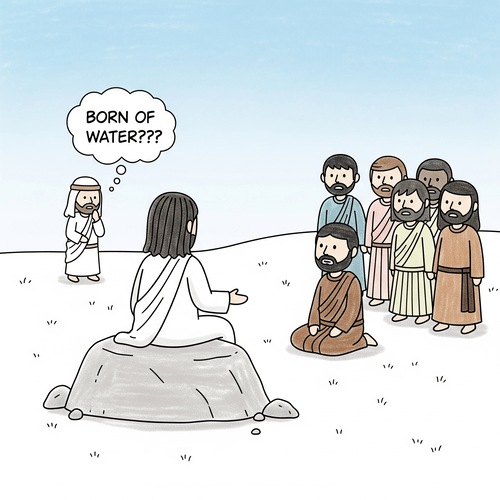God’s Foreknowledge: Far More Than Mere Foresight
When it comes to plumbing the depths of divine wisdom, God's foreknowledge is a concept that's both profound and often misunderstood. Some people assume foreknowledge is synonymous with foresight, reducing the omniscience of the Almighty to a simple peek down the tunnel of time. They believe that when the Bible speaks of God's foreknowledge, it merely means He observes what we will do with His Son, Jesus, and based on this foresight, He makes a reciprocal choice towards us. But this view falls short of the scriptural reality.
God's foreknowledge is more—way more—than mere foresight, it encompasses a dimension of divine understanding that transcends our limited human perspectives. Let's explore why foreknowledge, in its true biblical sense, is not just about seeing the future, but about a deeper, more intimate knowledge that shapes the very fabric of human existence.
Defining the Terms
Foreknowledge (the Greek prognosko) in the biblical sense refers to God's preordained, intimate knowledge and love for His people, not just a passive awareness of future events. It conveys a sense of predetermined relationship, a sovereign election, a special, relational knowing—a purposeful intention.
Foresight, on the other hand, simply means looking ahead and seeing what will happen. It implies a passive observation rather than an active, intimate involvement.
Four Reasons Foreknowledge Transcends Mere Foresight
- God's Omniscience: As the all-knowing, omniscient one, God has never had to look into the future to gain new knowledge. He possesses all wisdom inherently from eternity past. As Psalm 139:1-6 declares, God's knowledge is complete, extending even to our unformed thoughts. If He needed foresight to know the future, He would not be truly omniscient.
- Total Depravity: Scripture is clear that due to the fall, humanity is enslaved to sin (Romans 3:10-12). We have all gone astray like wandering sheep (Isaiah 53:6). If God's knowledge were limited to foresight, He would see that apart from His intervention, no sinful person would ever choose to embrace His Son Jesus (1 Corinthians 2:14). Total depravity negates the possibility of God foreseeing faith; His gracious election precedes faith.
- The Personal Pronoun: In Romans 8:29, the apostle Paul writes, "those whom He foreknew…" using a personal pronoun—notice it doesn't say "what He foresaw". This implies far more than impersonal foresight into facts. It conveys God's predetermined, intimate knowledge and love for particular people as His covenantal family.
- Original Language Depth: The Greek word ginosko refers to an intimate, personal knowing—such as how a husband "knows" his wife (Genesis 4:1). This depth is seen when the Bible describes God "knowing" Israel (Amos 3:2), or Jesus "knowing" His sheep (John 10:14, 27)—denoting far more than factual awareness. God's knowing signifies loving covenantal relationship.
Scriptural Evidence
- Genesis 4:1, 25: The term ginosko is used to describe Adam "knowing" his wife, a euphemism for an intimate love relationship resulting in conception. This intimacy goes beyond mere foresight. As the joke goes: "It took Adam more than foresight to get his wife pregnant. It took intimate 'knowledge".
- Amos 3:2: God speaks to Israel, saying, "You only have I known of all the families of the earth," indicating a chosen, special love exclusive to Israel, akin to a husband's love for his wife.
- Matthew 1:25: Joseph did not "know" Mary until she gave birth to Jesus, meaning he kept her a virgin, emphasising the intimate nature of the term.
- Matthew 7:21-23: Jesus says, "I never knew you," to those who profess faith but do not obey. Despite God's omniscience, this knowing refers to an intimate, saving relationship, not mere factual knowledge.
- John 10:14, 27: In the parable of the good shepherd, Jesus says, "I know my own and my own know me," highlighting an intimate, relational knowledge, not just awareness of identity.
- Acts 2:23: Peter, preaching at Pentecost, speaks of Jesus being delivered up by the predetermined plan and foreknowledge of God. This indicates God's eternal plan of salvation, not a reaction to future human decisions.
- 1 Peter 1:2, 20: Believers are chosen according to the foreknowledge of God the Father. Verse 20 says Jesus was foreknown before the foundation of the world, again emphasizing God's predetermined plan.
- Romans 9:13: This verse shows God's distinguishing love, "Jacob I loved, but Esau I hated," highlighting God's sovereign choice.
Conclusion
In the end, the Arminian attempt to reduce God's foreknowledge to mere foresight stems from a desire to spare God from appearing to "choose" some for salvation over others. However, this very notion of God's sovereign, electing choice is precisely what Scripture repeats and God Himself openly affirms—"Jacob I loved, but Esau I hated" (Romans 9:13). The omniscient Lord is not embarrassed or apologetic about His predetermined purposes, but rather keeps reminding us of His freedom to distribute grace as He wills (Romans 9:18).
Fidelity to the full scope of biblical revelation requires us to embrace foreknowledge as far more than impersonal foresight. It expresses God's eternal, covenantal love purposefully set upon particular people for redemption (Ephesians 1:4-6). To reduce it to mere foresight is to ignore the profound depth of texts like Romans 8:29, Acts 2:23, and the intimate relational implications inherent in the original Greek meanings.
While such sovereign election may make us uncomfortable, God's ways are not our ways (Isaiah 55:8-9). He has not called us to revise His Word to suit our philosophical preferences, but to submit our minds to His self-attesting revelation. Make no mistake—biblical foreknowledge is infinitely greater than mere foresight of human actions. It is the foundation of our redemption and eternal security in Christ. We must embrace and proclaim this truth with humble courage. For a more in-depth exploration of related questions, do check out the links below:
Related Reads
Editor's Pick

Rethinking Sickle Cell Anaemia: A Case for Intelligent Design
Sickle cell anaemia presents what many consider evolution’s strongest card—a genetic condition that causes suffering yet provides protection against malaria. [...]

‘Bad’ Design: Flaw in Nature Or Flaw in Our Perspective?
When the Eiffel Tower was first proposed, critics called it a monstrous eyesore that would ruin Paris forever. Today, it’s [...]

The Problem of Divine Absence: How Do Believers Cope?
WHEN GOD SEEMS FAR: THE GREAT DISCONNECT Ever wondered why God seemed so close to Joseph in his Egyptian prison, [...]

Is ‘Gay Christian’ a Biblically Acceptable Identity to Have?
THE QUESTION OF IDENTITY IN BIBLICAL PERSPECTIVE The term “gay Christian” has become increasingly common in contemporary religious discourse, representing [...]

What Does ‘Born of Water’ in John 3:5 Mean?
THE REFORMED VIEW VS OTHER INTERPRETATIONS ”Jesus answered, ‘Truly, truly, I say to you, unless one is born of water [...]

The Lordship Salvation Controversy: What’s It All About?
Can someone be truly saved without making Jesus Christ their Lord? The question sits at the heart of one of [...]

1 John 5:6: How Do Water and Blood Reveal Jesus’ True Identity?
"This is he who came by water and blood—Jesus Christ; not by the water only but by the water and [...]

Is Jesus Yahweh? Answering Unitarian Objections
The question of whether Jesus Christ is truly God has divided Christians for centuries. While orthodox Christianity has consistently affirmed [...]

Matthew 3:11: What Is the Baptism of Fire?
When John the Baptist declared, “He will baptise you with the Holy Spirit and fire” (Matthew 3:11), his words carried [...]

From Rock to Stumbling Block: Why Jesus Called Peter Satan
In the span of just six verses (Matthew 16:13-28), Peter goes from receiving the highest praise from Jesus to getting [...]
SUPPORT US:
Feel the Holy Spirit's gentle nudge to partner with us?
Donate Online:
Account Name: TRUTHS TO DIE FOR FOUNDATION
Account Number: 10243565459
Bank IFSC: IDFB0043391
Bank Name: IDFC FIRST BANK






